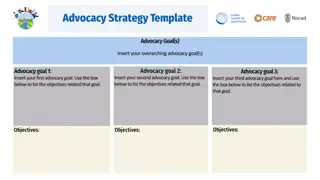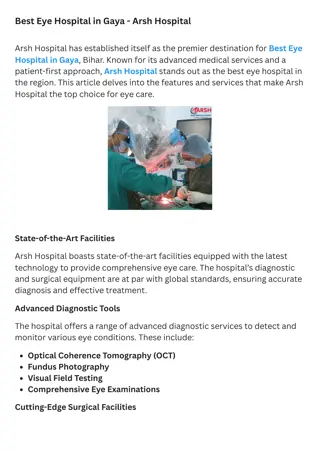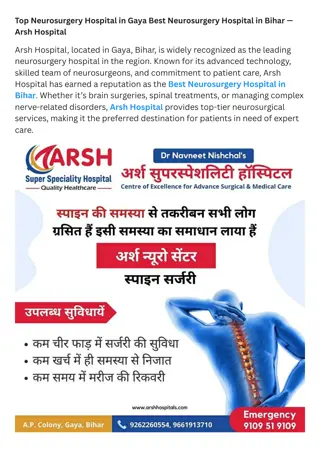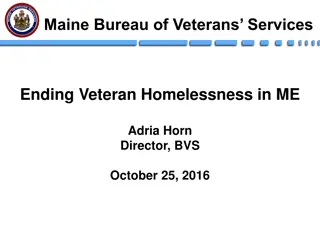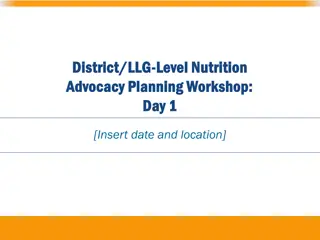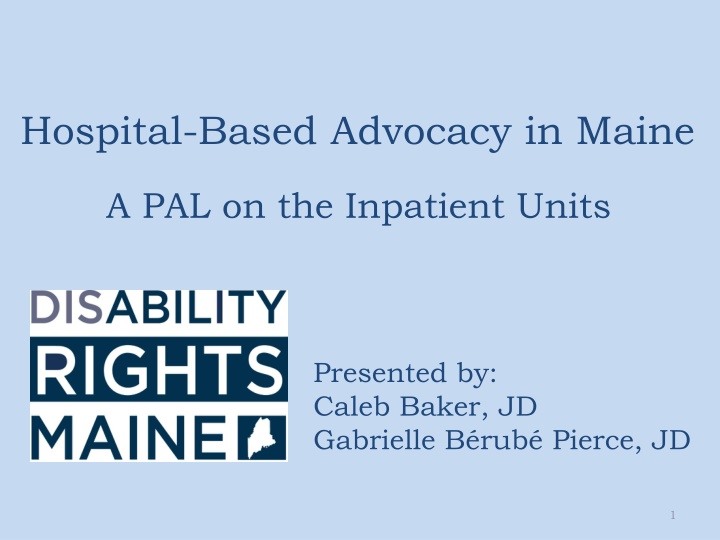
Hospital-Based Advocacy in Maine: Role, Benefits, and History
Explore the history and significance of hospital-based advocacy in Maine, focusing on the role of advocates, benefits, risks, and scope of assistance provided. Learn about the evolution of mental health advocacy and the crucial work carried out by hospital-based advocates in various settings.
Download Presentation

Please find below an Image/Link to download the presentation.
The content on the website is provided AS IS for your information and personal use only. It may not be sold, licensed, or shared on other websites without obtaining consent from the author. If you encounter any issues during the download, it is possible that the publisher has removed the file from their server.
You are allowed to download the files provided on this website for personal or commercial use, subject to the condition that they are used lawfully. All files are the property of their respective owners.
The content on the website is provided AS IS for your information and personal use only. It may not be sold, licensed, or shared on other websites without obtaining consent from the author.
E N D
Presentation Transcript
Hospital-Based Advocacy in Maine A PAL on the Inpatient Units Presented by: Caleb Baker, JD Gabrielle B rub Pierce, JD 1
Todays Discussion I. History of mental health advocacy in Maine II. Role of the advocate in the hospital setting: Prevention, Advocacy, and Legal remedies III.Benefits and risks of hospital-based advocacy IV.Conclusion, next steps, questions 2
Mental Health Advocacy in Maine: A brief history Advocates for the Disabled - 1977 Office of Advocacy (State Office) - 1983 PAIMI Statute (Access Authority for P&A) - 1986 Statutory designation of Maine s P&A 1989 AMHI Settlement Agreement 1990 State hospital advocacy services contracted with DRC 2005 Acadia Hospital hires hospital-based advocate 2010 3
The Role of the Advocate in a Psychiatric Hospital Historically Help clients assert their rights after a violation Monitor hospital conditions and policies for gross rights violations Today -Prevention -Advocacy -Legal remedies 4
Hospital-based Advocates DRM has contracts with 3 hospitals to provide hospital-based advocacy Riverview Psychiatric Center (1 full time and 1 part time advocate) Dorothea Dix Psychiatric Center (1 full time attorney advocate) Acadia Hospital (1 full time advocate) DRM also provides as-requested advocacy services in hospital emergency rooms, private psychiatric wards in general hospitals, private psychiatric hospitals, Private Non-Medical Institutes (group homes), club houses, and correctional facilities 5
Hospital-based Advocates: Scope of Assistance Advocates can provide advocacy services during inpatient stay and for a period of time after discharge for continuity and avoidance of re-hospitalization. Examples of this post-discharge advocacy include: Client living in a residential setting being assaulted by peers. Advocate assisted client with moving to a different home. Reports to licensing were made and provider cited for unsafe environment. Client facing eviction due to non-payment of rent because of inability to cash a check 6
Hospital-based Advocacy Services Prevention Formal and informal trainings for staff and clients on rights issues, legal matters Regular and continuous communication with clients, hospital staff, and administration Ongoing monitoring and presence on inpatient units 7
Hospital-based Advocacy: Enforcing Reasonableness in an Unreasonable World Examples of preventing rights violations: Gavin s Ride to Freedom Gertrude s Lunch Fiasco Glenn s Medical Records Reveal Glenda s Individualized Treatment Trainings, trainings, and more trainings! 8
Hospital-based Advocacy Services Advocacy Encourage and engage clients in self-advocacy Individual advocacy on issues including treatment, medication, discharge planning Systemic advocacy to ensure State and provider adherence to patient rights and professional standards Optimizing least restrictive outcomes for clients through ongoing negotiation with hospital staff and administration, and community providers and guardians 9
Advocacy Anecdotes Least restrictive alternatives: Billy s alternatives to guardianship Bobbie s fresh air break Forensic issues: Bertram s DVD player Ben s community staff Nutrition: Belle s lunch Training and policy modification: Kicking MOAB and prone restraints to the curb 10
Hospital-based Advocacy Services Legal Remedies Facilitation of grievance process, including negotiation of resolutions Filing of complaints to address individual and systemic issues Referral to DRM attorneys and other legal providers for individual representation Assistance in navigating complicated legal processes Collaboration with other legal services agencies and attorneys Monitoring legal processes to identify due process concerns 11
Legal Remedy Examples Rachel s food allergies, a study in PHI Ralph s very reasonable accommodation Ricardo s appeal CRPs Civil Commitment Post-Conviction Review Rebecca s long, strange trip through the halls of justice What s a guy gotta do to get a grievance response around here? 12
What are the benefits? Avoidance of many major rights issues Familiarity and trust among advocates and clients as well as hospital staff Identifying trends in hospital practices Opportunities for tailored trainings, collaboration on policy development Clear understanding of the roles of staff and administrators at the facilities Ability to troubleshoot individual and systemic issues within and outside of the hospital to ensure swift discharge to the community Ensuring resolution to issues, remedies actually implemented Post-discharge follow up and assistance leads to less frequent rehospitalization 13
The potential drawbacks? Juggling competing client interests Keeping issues in perspective big picture systemic issues vs. individual issues Picking the right battles ex. privileges vs. rights Desensitization to recurrent issues Often difficult to quantify the role of the advocate due to early intervention, hard to measure the impact of our advocacy 14
Mitigating Drawbacks, Optimizing Benefits of Hospital-based Advocates Awareness of potential challenges Supervision and consultation with non-hospital based advocacy staff Clear priorities, objectives, and goals for hospital-based advocates To the greatest extent possible, independence from State or Private Hospital discretionary funding (should not be able to remove the advocates from the hospital on a whim, due to adverse interactions) 15
Thank You! Please feel free to contact us! Caleb Baker cbaker@drme.org Gabrielle B rub Pierce gbpierce@drme.org 16

